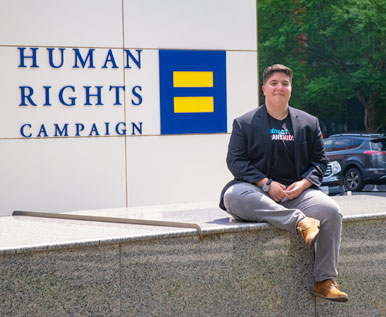
In February, the Texas Department of Family and Protective Services—under a contentious new directive from Governor Greg Abbott—began investigating parents of transgender youth for possible abuse. Their “crime”: providing their children with medically necessary gender-affirming care.
The executive order comes amid the worst year in American history for anti-LGBTQ legislation. As of June, 280 bills have been introduced across the country—25 percent of them in the South alone.
As an intern with Human Rights Campaign’s Project One America, it’s Kendall Kalustyan’s job to help advance legal protections and build more inclusive institutions for LGBTQ people in four of those Southern states: Alabama, Arkansas, Mississippi, and Texas. In his role with POA—the Human Rights Campaign’s historic $8.5 million effort centered on the corner of the country it terms the “finish line” for LGBTQ equality—the AU senior assists advocates on the ground, conducts opposition research, and monitors legislation.
“The fear is very real with these bills. Suicide rates among queer youth are disproportionate to begin with. If you take away an outlet like sports, or take away any hope for the future, it’s only going to get worse,” says Kalustyan, SPA/BA ’22. “And in Texas, it’s as dire as keeping kids with their families. It’s not an exaggeration to say this is a life-or-death situation for queer youth.”
For Kalustyan, who identifies as transgender, the fight is personal.
“Growing up and always knowing I was different, I felt pretty alone. It wasn’t until I attended a sleepaway camp for queer kids, Odyssey Teen Camp, when I was 14 that I learned about feminism and advocacy and that being trans was a thing,” he says. “Now I want to use my privilege to stand up for those other quiet kids who don’t feel like they have a voice.”
After coming out in 2015, the New Jersey native saw many of the protections enacted by President Obama swiftly eroded under his successor. On President Trump’s first day in office, for example, all mentions of LGBTQ people were scrubbed from the White House’s website—sending a powerful message to the 7.1 percent of Americans who identify as such, according to Gallup.
“We’ve seen heightened attacks specifically on the trans community: the military ban and issues around sports participation, bathrooms, and medical care,” says Kalustyan, a CLEG major. “I wish we could say we were winning battles and beating bills, but in all honesty, we’re getting our [butts] kicked right now. And that’s exactly why we can’t stop fighting.
“It’s incredibly motivating when your own rights are at stake.”
According to the Williams Institute at the UCLA School of Law, 63 percent of the nation’s LGBTQ population lives in the Midwest, Mountain, and Southern regions—areas that also offer the fewest legal protections. Alabama, Arkansas, Mississippi, and Texas—the swath of the South where POA is focused—are among a majority of states offering no nondiscrimination protection for LGBTQ people at the state or local level in employment, housing, or public accommodations.
The South also boasts the lowest rating—55—on the institute’s social climate index, a measure of how accepting a region is of its LGBTQ residents. (The Northeast tops the index at 71.)
And yet, Kalustyan—who signed up for a second stint at POA, interning at HRC’s DC headquarters through the summer until he graduates in August—is hopeful that it’s possible to carve out more safe space for LGBTQ Southerners, even amid the polarized state of America.
“People have multiple identities. You can be queer and religious and use that to your advantage to have a conversation with someone who might not agree with you,” says the aspiring lawyer. “It’s about finding common ground and tapping into other people’s humanity. I truly believe if we can cross the aisle and have those conversations in the Southern US, then we can do it anywhere.”